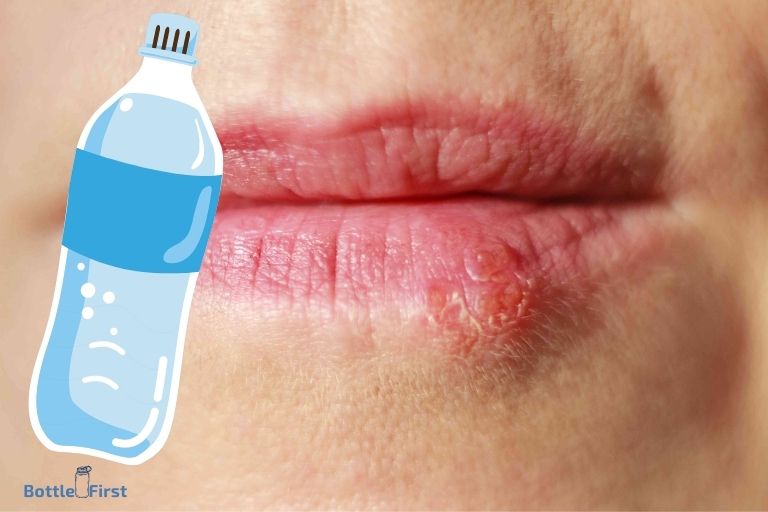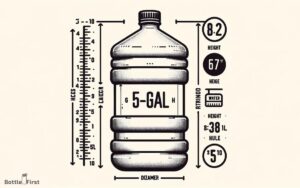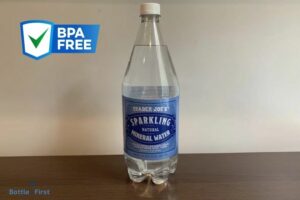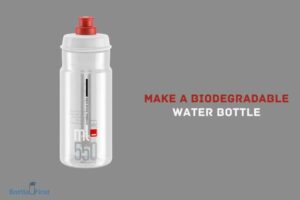Can You Get Herpes from Drinking Someone’s Water Bottle?
No, you cannot get herpes from sharing a water bottle. Herpes is transmitted through direct skin-to-skin contact such as kissing or sexual contact, not through casual contact or sharing drinks.
Herpes is a viral infection caused by the herpes simplex virus (HSV), which is transmitted through direct contact with the virus.
This often occurs through kissing, sexual contact, or touching a sore. It’s also possible to get herpes from an infected person even when they don’t have any visible sores.
However, the virus does not survive long on inanimate objects such as a water bottle, which makes the likelihood of contracting the virus in this way extremely low.
While it’s true that the herpes virus does not survive long on inanimate objects like water bottles, this doesn’t mean you should disregard the importance of good hygiene. Always make it a habit to clean and disinfect shared items, particularly during a viral outbreak.
While the risk of getting herpes from a water bottle is extremely low, good hygiene practices can help prevent the spread of other illnesses.
Two Possibilities You Get Herpes from Drinking Someone’s Water Bottle
| Possibility | Evidence | Explanation |
|---|---|---|
| Yes | Limited | Though herpes is primarily transmitted through direct contact with a herpes infection (including oral, genital, or skin-to-skin contact) some studies suggest it may survive for short periods on objects. |
| No | Strong | Medical professionals and scientific studies clarify that the herpes virus does not live very long outside the body, such as on a water bottle. It is generally perceived that the risk of contracting herpes this way is very low. |
Key Takeaway

Five Facts About:
Understanding Herpes Transmission
Herpes is a common viral infection that affects millions of people worldwide. It is important to have a clear understanding of how herpes is transmitted in order to protect ourselves and our loved ones.
What Is Herpes?
Herpes is a viral infection caused by the herpes simplex virus (hsv).
There are two main types of herpes:
Hsv-1 and hsv-2.
- Hsv-1 is typically associated with oral herpes, commonly known as cold sores or fever blisters.
- Hsv-2 is primarily responsible for genital herpes, a sexually transmitted infection.
How Is Herpes Transmitted?
- Herpes can be transmitted through direct contact with the infected area or bodily fluids of an infected person.
- The most common mode of transmission is through sexual contact, including vaginal, anal, and oral sex.
- Sharing personal items such as towels, utensils, or drinking from the same water bottle as someone with an active herpes outbreak can also lead to transmission.
- It is important to note that herpes can be transmitted even when there are no visible symptoms or sores present. This is known as asymptomatic shedding.
Exploring The Different Types Of Herpes
Hsv-1: Oral herpes
- Cold sores or fever blisters are the most common manifestation of oral herpes.
- It is estimated that around 50-80% of adults in the united states have been infected with hsv-1.
- The primary mode of transmission is through direct contact with an active outbreak, but it can also be spread through sharing personal items and intimate contact.
Hsv-2: Genital herpes
- Genital herpes is primarily transmitted through sexual contact, including vaginal, anal, and oral sex.
- It is estimated that around 11% of the adult population in the united states has been infected with hsv-2.
- Symptoms can include painful blisters or sores in the genital or anal area, itching, and flu-like symptoms.
Herpes is a viral infection that can be transmitted through various modes, including sexual contact and sharing personal items. It is essential to practice safe and hygienic habits to minimize the risk of transmission.
If you suspect you may have herpes or have been exposed to the virus, it is crucial to seek medical advice for diagnosis and appropriate management.
Debunking Common Myths
Many myths surround herpes, a viral infection that can cause cold sores or genital sores. One common misconception is the belief that you can contract herpes by sharing someone else’s water bottle.
Dispelling Misconceptions About Herpes Transmission
Contrary to popular belief, herpes is not easily transmitted through indirect contact, such as sharing water bottles or utensils.
While the herpes simplex virus (hsv) can be contracted through direct skin-to-skin contact with an infected individual, certain conditions need to be met for transmission to occur.
Here are the key points to consider:
- Herpes transmission requires direct contact with an active outbreak: The virus is most contagious when an individual is experiencing visible sores or blisters. Without an active outbreak, the risk of transmission is significantly reduced.
- Herpes is primarily transmitted through skin-to-skin contact: The virus enters the body through small breaks in the skin or mucous membranes. Sharing a water bottle, which involves minimal contact, does not provide the necessary conditions for transmission.
Addressing The Fear Of Contracting Herpes Through Indirect Contact
Even though the risk of contracting herpes through sharing a water bottle is low, it’s natural to have concerns.
Here’s a brief overview of why contracting herpes through indirect contact is unlikely:
- The herpes virus is delicate: It cannot survive for long periods outside the human body. This means that even if the virus were present on a water bottle, it would quickly become inactive and unable to cause infection.
- Saliva is not the primary mode of transmission: While saliva can contain the herpes virus, its concentration is generally low, making it less likely to lead to transmission. In addition, saliva contains enzymes that help combat the virus, further reducing the risk.
Clarifying The Role Of Saliva And Water Bottle Sharing In Herpes Transmission
To better understand the role of saliva and water bottle sharing in herpes transmission, consider the following points:
- Saliva acts as a protective barrier: Saliva contains enzymes and antibodies that help neutralize the herpes virus. This defense mechanism further reduces the risk of transmission through shared water bottles.
- Personal hygiene practices minimize the risk: Simple measures, such as regularly cleaning water bottles, can greatly reduce the potential for transmitting herpes or other infections. Practicing good personal hygiene, including washing hands frequently, is also essential.
Remember, transmitting herpes requires direct contact with an active outbreak, not merely sharing someone’s water bottle.
By dispelling these common myths and understanding the facts, you can alleviate concerns and make informed decisions regarding your health and well-being.
The Science Behind Herpes Transmission
Herpes simplex virus (hsv) is a common viral infection that can be easily transmitted from person to person.
To understand the risk of contracting herpes from drinking someone’s water bottle, let’s explore the infectious nature of hsv, the conditions required for transmission, and the limited survival of the virus outside the body.
Exploring The Infectious Nature Of Herpes Simplex Virus (Hsv)
Hsv is a highly contagious virus that primarily spreads through close personal contact. It is most commonly transmitted through direct skin-to-skin contact, particularly during periods of viral shedding or when active sores or blisters are present.
There are two types of hsv: Hsv-1, which typically causes oral herpes, and hsv-2, which generally leads to genital herpes. However, both types can infect either region.
- Despite the name, oral herpes can also be transmitted through oral-genital contact, while genital herpes can be transmitted through genital-oral contact.
- It’s important to note that herpes can be transmitted even without visible symptoms or sores present, as the virus can still be shed asymptomatically.
Understanding The Conditions Required For Hsv Transmission
Hsv requires specific conditions to be present in order to be transmitted from one person to another.
These conditions include:
- Sufficient contact: Hsv transmission typically requires direct contact between an infected individual’s skin or mucous membranes and the mucous membranes of another person. Drinking from someone’s water bottle does not usually provide enough contact for transmission.
- Active shedding: Hsv can be spread during periods of viral shedding, where the virus is present on the skin’s surface even without visible symptoms. However, the virus is most contagious when active sores or blisters are present.
- Viral load: The risk of transmission is generally higher when the infected individual has a higher viral load, such as during an active outbreak. Individuals with recurrent herpes infections generally have lower viral loads during asymptomatic shedding, reducing the risk of transmission.
Shedding Light On The Limited Survival Of Hsv Outside The Body
- Hsv is a fragile virus that does not survive long outside the human body. It is sensitive to environmental factors, including temperature, humidity, and exposure to uv light. The virus cannot survive for extended periods on surfaces like water bottles.
- Studies have shown that hsv can survive for a short period on inanimate objects, but the risk of transmission from objects like water bottles is incredibly low. The virus quickly loses its infectivity once outside the body.
- Hsv transmission typically occurs through direct contact with the infected individual’s skin or mucous membranes. Drinking from someone’s water bottle does not provide the necessary conditions for transmission unless there is direct contact with infected bodily fluids.
While it’s important to take necessary precautions to minimize the risk of hsv transmission, it is highly unlikely to contract herpes from drinking someone’s water bottle.
Transmission primarily occurs through direct skin-to-skin contact or contact with infected bodily fluids.
By understanding the science behind herpes transmission, you can make informed decisions about your risk and take appropriate measures to protect yourself and others.
Exploring Possible Herpes Transmission Routes
Can You Get Herpes From Drinking Someone’S Water Bottle?
When it comes to herpes, understanding how it can be transmitted is essential.
While sexual contact is the most common way to contract the virus, many people wonder about the risk of transmission through seemingly innocent activities, like drinking from someone else’s water bottle.
Examining The Risks Of Herpes Transmission Through Direct Contact
- Direct skin-to-skin contact is the primary mode of herpes transmission, especially when an outbreak is present. The herpes simplex virus (hsv) can enter the body through small breaks in the skin or mucous membranes.
- Herpes can be transmitted through kissing, intimate contact, or any other form of direct contact with infected skin or mucous membranes.
- It’s important to note that herpes can also be transmitted even when there are no visible symptoms or sores present. This is known as asymptomatic shedding, where the virus is still active and can be passed on to others.
Analyzing The Likelihood Of Herpes Transmission Via Shared Objects
- Sharing personal objects, such as water bottles, utensils, or towels, does carry a certain level of risk for herpes transmission.
- While the transmission of herpes through inanimate objects is less common compared to direct contact, it is still possible if the object is contaminated with infected fluids (such as saliva) and comes into contact with broken skin or mucous membranes.
- The risk of transmission can be minimized by practicing good hygiene, such as regularly cleaning and disinfecting shared objects, or using personal items whenever possible.
Investigating The Role Of Saliva In Herpes Transmission
- Saliva plays a significant role in the transmission of herpes, as the virus can be present in oral secretions even without visible symptoms.
- It’s important to exercise caution when engaging in activities that involve direct contact with saliva, such as sharing food, drinks, or utensils, as this can potentially transmit the virus.
- It’s worth mentioning that the risk of transmission is higher during an active outbreak, but it’s still possible to contract herpes even when no symptoms are present.
- Practicing good oral hygiene and avoiding direct contact with saliva can reduce the risk of transmission.
While the risk of contracting herpes through activities like drinking from someone else’s water bottle is relatively low, it’s still important to be aware of the potential transmission routes.
Maintaining good personal hygiene and avoiding direct skin-to-skin contact or sharing personal objects can help minimize the risk.
If you have concerns or suspect you may have been exposed to herpes, it is always recommended to consult with a healthcare professional for proper diagnosis and guidance.
Stay informed and take necessary precautions to ensure your well-being.
Preventive Measures And Safe Practices
When it comes to preventing herpes transmission, taking the necessary precautions can significantly reduce the risk of contracting the virus.
By implementing a few preventive measures and safe practices, you can safeguard yourself and others from this sexually transmitted infection.
Let’s explore some effective ways to prevent herpes transmission:
Highlighting effective ways to prevent herpes transmission:
- Practicing safe sex: Using latex condoms correctly and consistently can greatly reduce the risk of herpes transmission.
- Limiting sexual partners: Engaging in a monogamous relationship with a partner who has been tested for herpes can minimize the chances of infection.
- Avoiding sexual contact during outbreaks: Refraining from any sexual activities when visible symptoms, such as sores or blisters, are present can help prevent spreading the virus.
- Taking antiviral medications: Consult with a healthcare professional about antiviral medications that can help reduce the frequency and severity of herpes outbreaks.
Promoting awareness of personal hygiene and cleanliness:
- Frequent handwashing: Encouraging regular handwashing with soap and water can help reduce the transmission of herpes and other infectious diseases.
- Avoiding sharing personal items: Discourage the sharing of items such as toothbrushes, razors, or towels, as these can harbor the virus and facilitate its spread.
- Cleaning and disinfecting surfaces: Regularly disinfecting surfaces that come into contact with bodily fluids, such as bathroom countertops or exercise equipment, can minimize the risk of transmission.
Encouraging open communication and education on herpes:
- Discussing sexual health with partners: Having open conversations about herpes, sexual health, and sti testing can foster trust and understanding between partners.
- Seeking education and information: Stay informed about herpes by consulting reputable sources, such as healthcare professionals or credible websites. This can help dispel myths and misconceptions surrounding the virus.
- Supporting awareness campaigns: Promote educational initiatives that aim to raise awareness about herpes, its transmission, and available treatments. By spreading accurate information, we can combat the stigma associated with this infection.
Remember, practicing preventive measures and safe practices not only protects yourself but also promotes the well-being of others.
By taking proactive steps, you can make a significant impact in reducing the transmission of herpes and promoting overall sexual health. Stay informed, open, and committed to prevention—it’s the best defense against herpes.
FAQ About You Get Herpes From Drinking Someone’S Water Bottle
Can You Get Herpes From Sharing A Water Bottle?
No, herpes cannot be transmitted through sharing a water bottle. It is primarily spread through direct skin-to-skin contact.
Is It Possible To Contract Herpes From Someone’S Saliva?
Yes, herpes can be transmitted through contact with infected saliva, especially during close personal contact such as kissing or sharing drinks.
How Long Does The Herpes Virus Survive On Surfaces?
The herpes virus does not survive long outside the human body. It is easily inactivated by drying, making transmission through surfaces unlikely.
Can Herpes Be Transmitted Even If There Are No Visible Sores?
Yes, herpes can still be transmitted even if there are no visible sores. It can be spread through viral shedding, which can occur without any symptoms.
Conclusion
It is highly unlikely to contract herpes from drinking someone’s water bottle due to the virus’s low survival ability outside the body.
Herpes is primarily transmitted through direct skin-to-skin contact during intimate activities such as kissing, oral sex, or sexual intercourse.
While sharing a water bottle may carry other risks of transmitting bacteria and viruses, the herpes virus is not easily transferred in this manner.
To stay safe and reduce the chances of contracting herpes or other infections, it is always advisable to avoid sharing personal items such as water bottles, especially if the person has an active outbreak or visible sores.
Practicing good hygiene, maintaining personal items, and being aware of the risk factors associated with herpes are essential steps in protecting oneself and preventing the spread of the virus.






